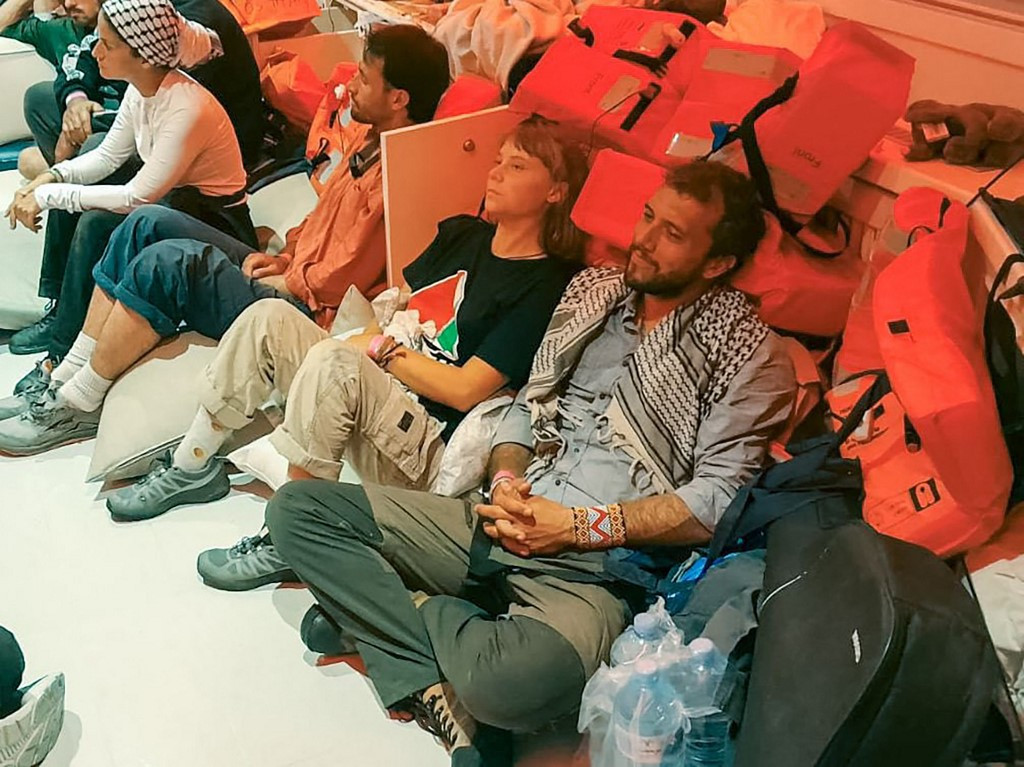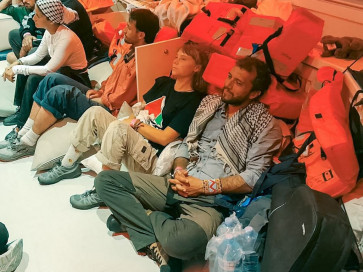Popular Reads
Top Results
Can't find what you're looking for?
View all search resultsPopular Reads
Top Results
Can't find what you're looking for?
View all search resultsIndonesia’s diplomatic test after interception of civilian flotilla
Indonesia should initiate a multilateral humanitarian platform to develop international protocols for the protection of maritime humanitarian missions.
Change text size
Gift Premium Articles
to Anyone
 This handout picture released by the Israeli Foreign Ministry shows Swedish climate activist Greta Thunberg (center) and Brazilian activist Thiago Avila (right), along with other activists, after the Israeli navy intercepted the Global Sumud Flotilla carrying humanitarian aid to Gaza on Oct. 1, 2025, as stated by the ministry. (AFP/Israeli Foreign Ministry)
This handout picture released by the Israeli Foreign Ministry shows Swedish climate activist Greta Thunberg (center) and Brazilian activist Thiago Avila (right), along with other activists, after the Israeli navy intercepted the Global Sumud Flotilla carrying humanitarian aid to Gaza on Oct. 1, 2025, as stated by the ministry. (AFP/Israeli Foreign Ministry)
T
he Global Sumud Flotilla, comprising 47 humanitarian ships, was intercepted by the Israel Defense Forces (IDF) in the Eastern Mediterranean on Oct. 2. This incident immediately marked another tragic episode in the enduring Israeli–Palestinian conflict.
The interception, occurring in international waters, led to the detention of 443 humanitarian activists from 32 nations, NGO workers, journalists and former public officials. They were attempting to deliver food and medical aid to Gaza, a territory under an 18-year blockade.
Israeli Prime Minister Benjamin Netanyahu described the naval operation as “the most professional and efficient mission” to prevent “unauthorized vessels.” Yet, for much of the international community, it exposed a grave violation of international maritime law and humanitarian principles. Amnesty International condemned it as an act of “systematic intimidation designed to silence humanitarian voices.”
Beyond its immediate tragedy, the incident raises fundamental questions about the legitimacy of Israel’s maritime blockade, the integrity of international law and global moral consistency. For Indonesia, a staunch supporter of Palestinian self-determination and a champion of international law, the episode presents a defining test of its newly articulated Good Neighborhood Policy and its long-standing bebas-aktif (independent and active) foreign policy doctrine.
At the crisis's core is deep ambiguity in interpreting international maritime law. The 1982 United Nations Convention on the Law of the Sea (UNCLOS), to which Indonesia is a party, protects the freedom of navigation on the high seas (Article 87).
The interception of a civilian humanitarian flotilla in international waters, therefore, violates UNCLOS on a prima facie basis. As Israel is not a party to the convention, its invocation of maritime enforcement powers is legally tenuous.
The Gaza blockade, imposed since 2007, rests on fragile legal ground. Article 23 of the Fourth Geneva Convention obliges parties to allow the free passage of humanitarian relief. Israel’s prolonged blockade, which has caused chronic food insecurity for up to 90 percent of Gaza’s population (according to the World Food Program), directly contradicts the spirit of humanitarian law.


















